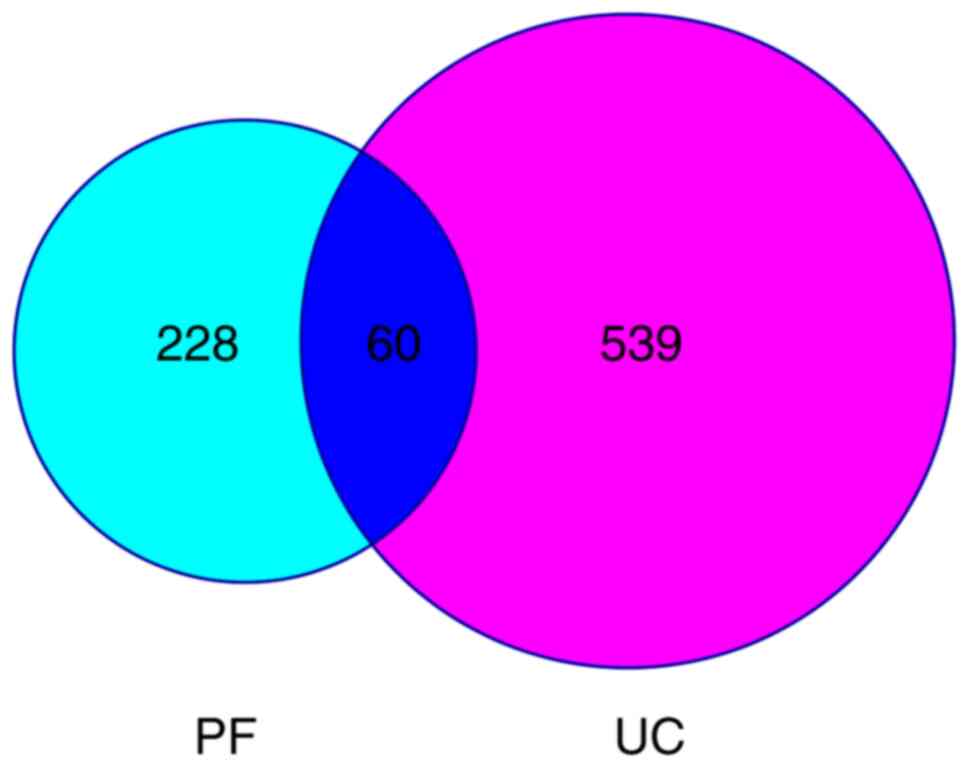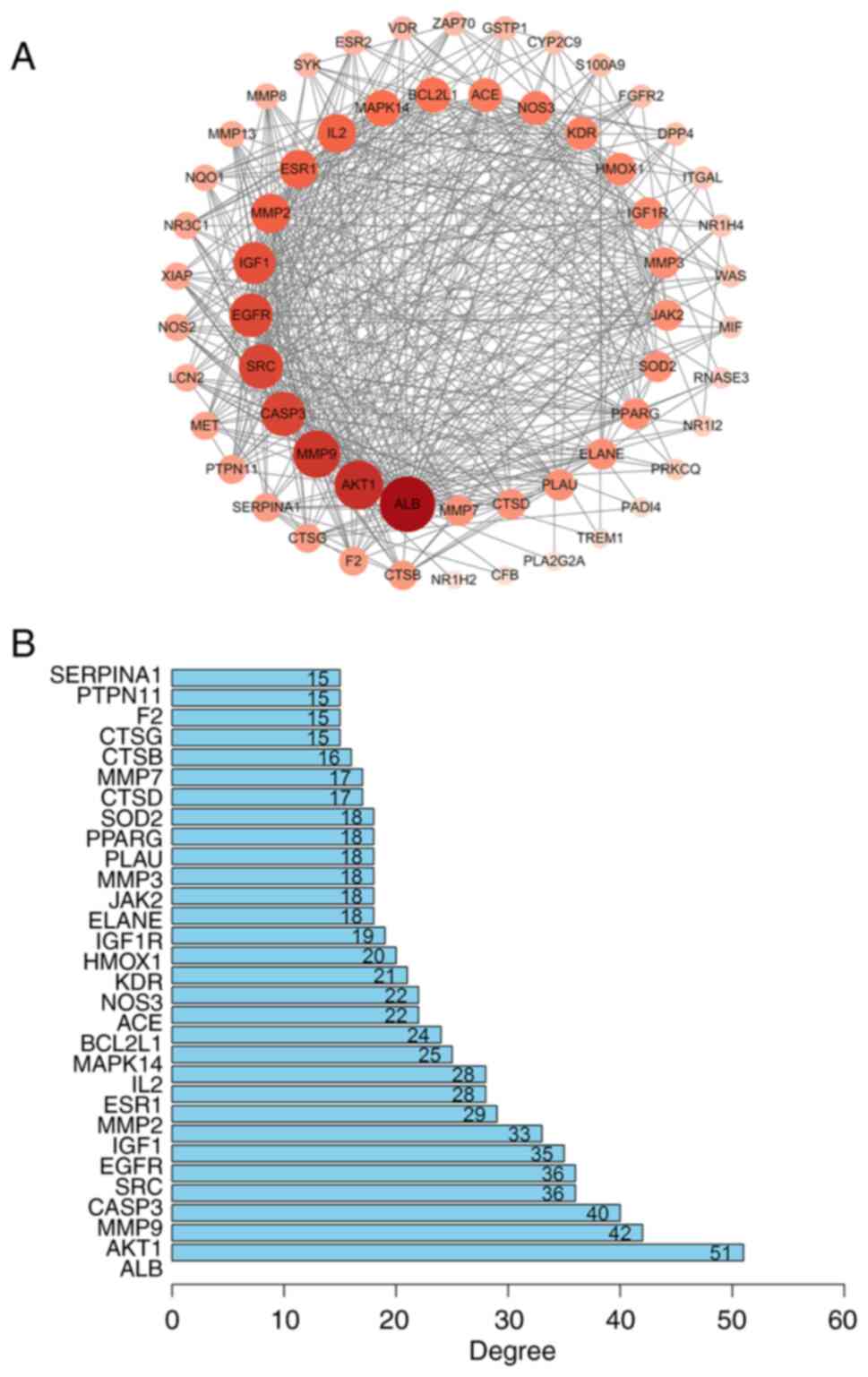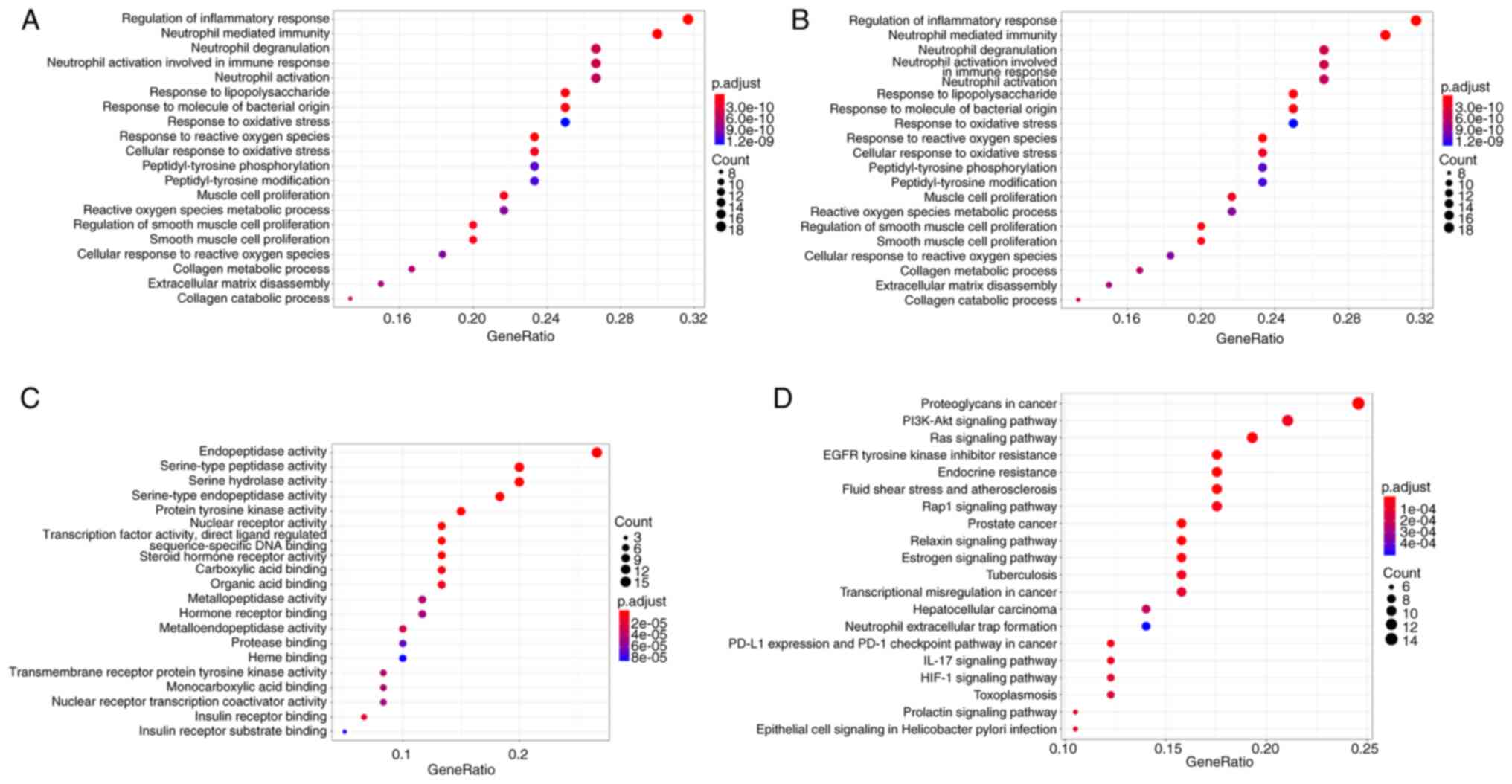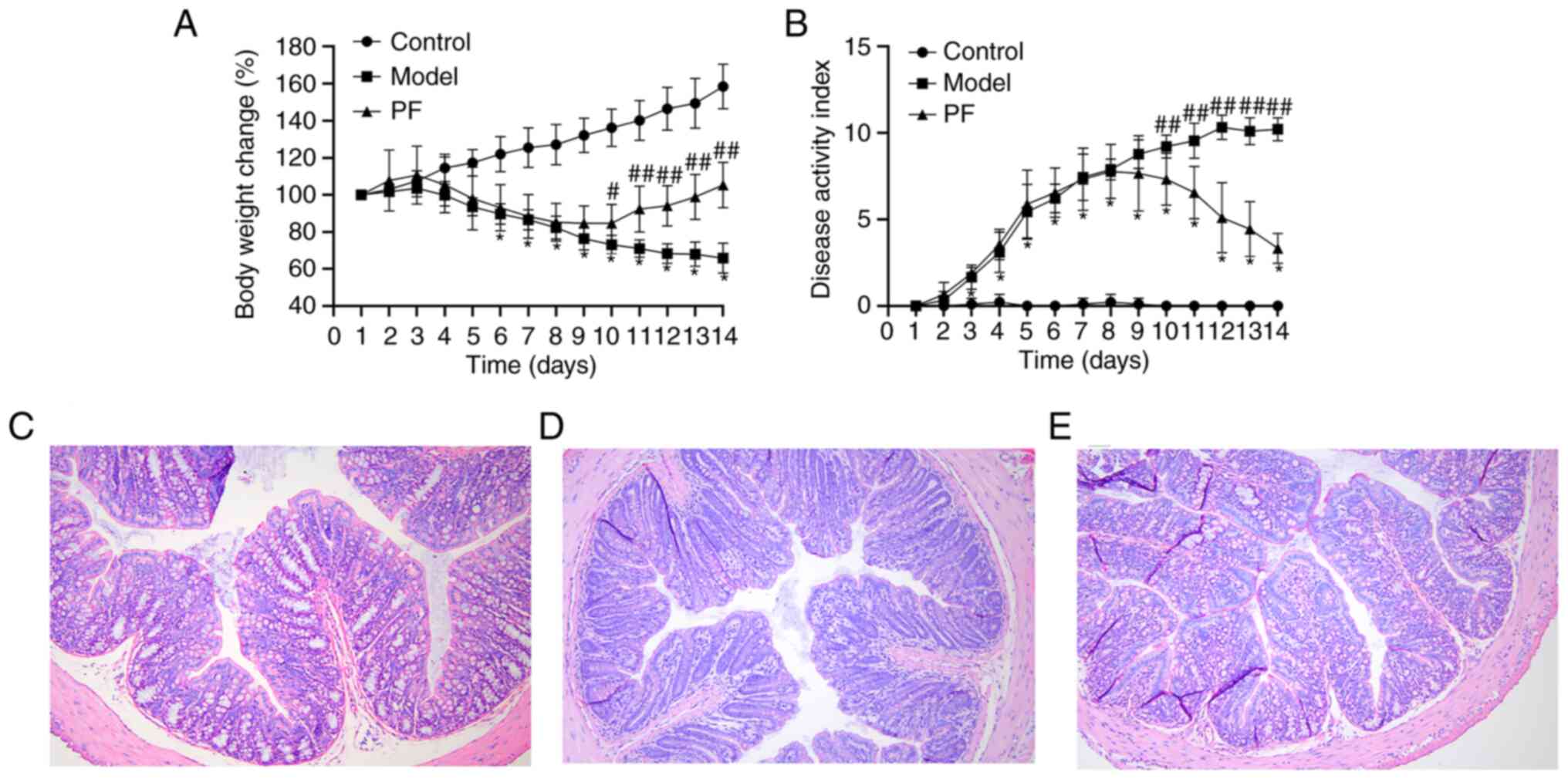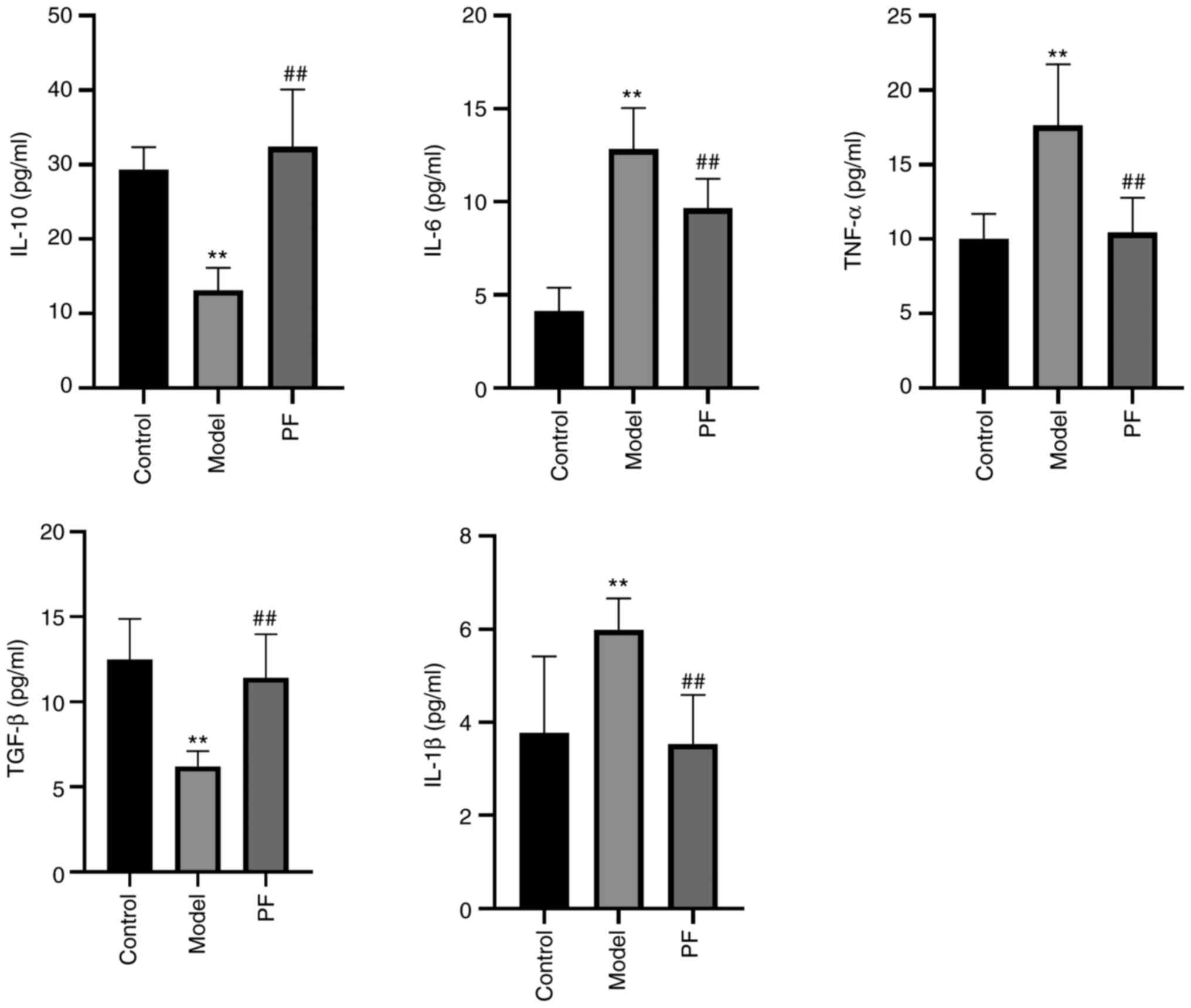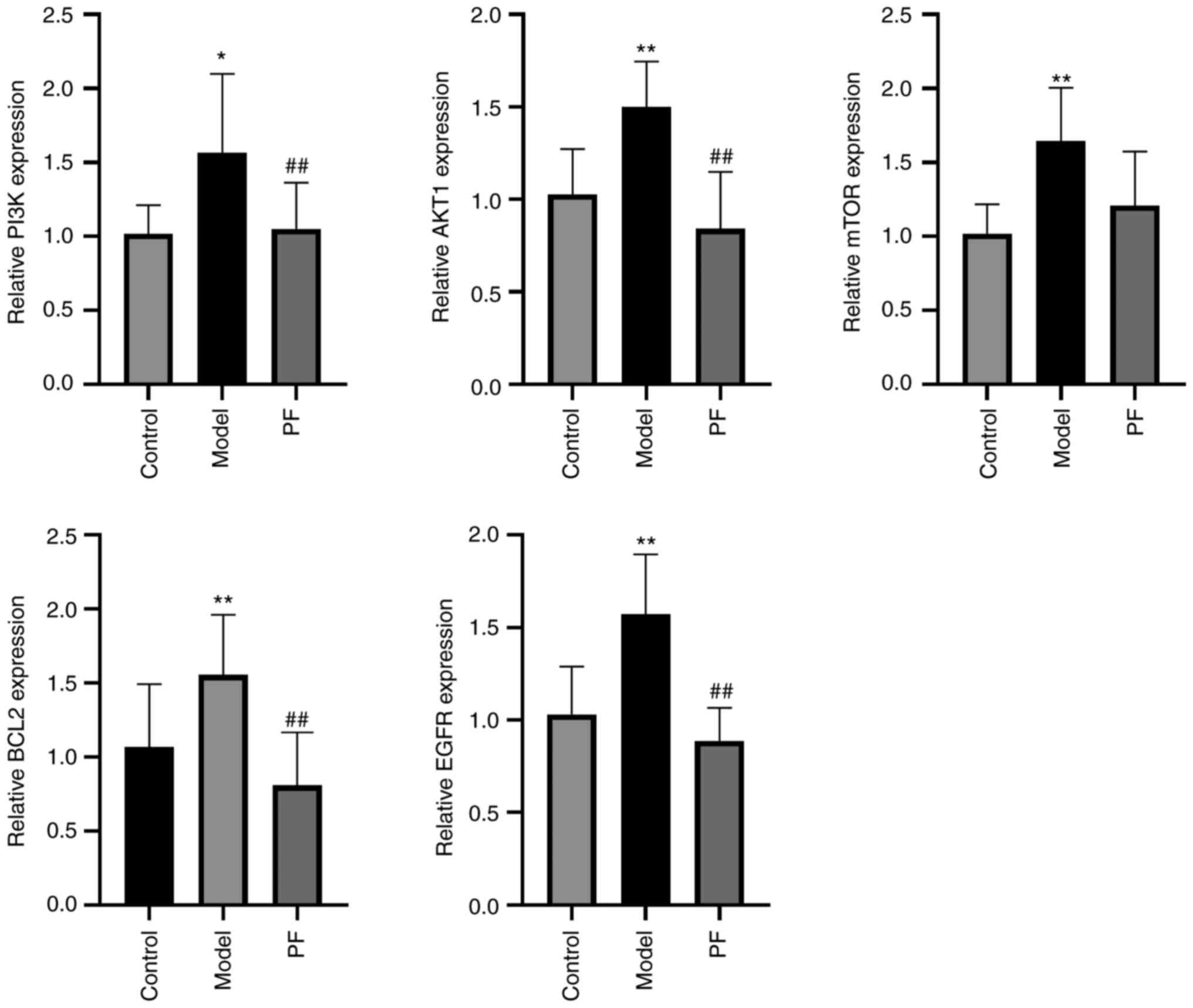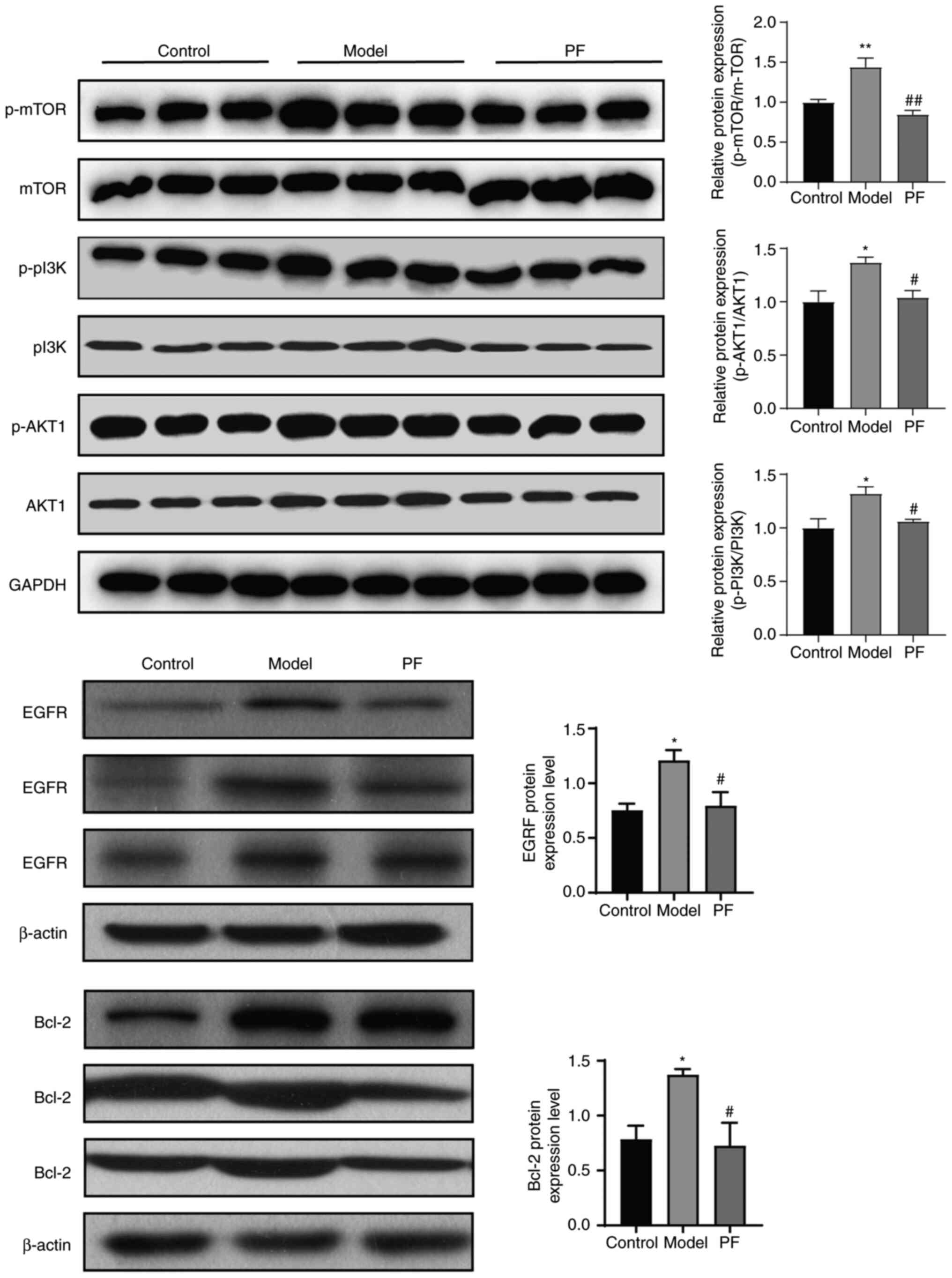|
1
|
Feuerstein JD, Moss AC and Farraye FA:
Ulcerative colitis. Mayo Clin Proc. 94:1357–1373. 2019.PubMed/NCBI View Article : Google Scholar
|
|
2
|
Neurath MF and Leppkes M: Resolution of
ulcerative colitis. Semin Immunopathol. 41:747–756. 2019.PubMed/NCBI View Article : Google Scholar
|
|
3
|
Krishna M, Britto S, Qian J, Ihekweazu F,
Rodriguez JR and Kellermayer R: Diagnostic delay and colectomy risk
in pediatric ulcerative colitis. J Pediatr Surg. 55:403–405.
2020.PubMed/NCBI View Article : Google Scholar
|
|
4
|
Danese S and Fiocchi C: Ulcerative
colitis. N Engl J Med. 365:1713–1725. 2011.PubMed/NCBI View Article : Google Scholar
|
|
5
|
Loftus EV Jr: Clinical epidemiology of
inflammatory bowel disease: Incidence, prevalence, and
environmental influences. Gastroenterology. 126:1504–1517.
2004.PubMed/NCBI View Article : Google Scholar
|
|
6
|
Langholz E, Munkholm P, Nielsen OH,
Kreiner S and Binder V: Incidence and prevalence of ulcerative
colitis in Copenhagen county from 1962 to 1987. Scand J
Gastroenterol. 26:1247–1256. 1991.PubMed/NCBI View Article : Google Scholar
|
|
7
|
Kaistha A and Levine J: Inflammatory bowel
disease: The classic gastrointestinal autoimmune disease. Curr
Probl Pediatr Adolesc Health Care. 44:328–334. 2014.PubMed/NCBI View Article : Google Scholar
|
|
8
|
Miyamoto Y, Suyama K and Baba H: Recent
advances in targeting the EGFR signaling pathway for the treatment
of metastatic colorectal cancer. Int J Mol Sci.
18(752)2017.PubMed/NCBI View Article : Google Scholar
|
|
9
|
Gisbert JP and Chaparro M: Acute severe
ulcerative colitis: State of the art treatment. Best Pract Res Clin
Gastroenterol. 32-33:59–69. 2018.PubMed/NCBI View Article : Google Scholar
|
|
10
|
Duijvestein M, Battat R, Vande Casteele N,
D'Haens GR, Sandborn WJ, Khanna R, Jairath V and Feagan BG: Novel
therapies and treatment strategies for patients with inflammatory
bowel disease. Curr Treat Options Gastroenterol. 16:129–146.
2018.PubMed/NCBI View Article : Google Scholar
|
|
11
|
Wang YN, Li J, Zheng WY, Wu D, Yang H, Li
Y, Lv H, Tan B, Shu HJ, Sun XY, et al: Clinical characteristics of
ulcerative colitis-related colorectal cancer in Chinese patients. J
Dig Dis. 18:684–690. 2017.PubMed/NCBI View Article : Google Scholar
|
|
12
|
Bezzio C, Furfaro F, de Franchis R, Maconi
G, Asthana AK and Ardizzone S: Ulcerative colitis: Current
pharmacotherapy and future directions. Expert Opin Pharmacother.
15:1659–1670. 2014.PubMed/NCBI View Article : Google Scholar
|
|
13
|
Kobayashi T, Siegmund B, Le Berre C, Wei
SC, Ferrante M, Shen B, Bernstein CN, Danese S, Peyrin-Biroulet L
and Hibi T: Ulcerative colitis. Nat Rev Dis Primers.
6(74)2020.PubMed/NCBI View Article : Google Scholar
|
|
14
|
Gao Q, Tian W, Yang H, Hu H, Zheng J, Yao
X, Hu B and Liu H: Shen-Ling-Bai-Zhu-San alleviates the imbalance
of intestinal homeostasis in dextran sodium sulfate-induced colitis
mice by regulating gut microbiota and inhibiting the NLRP3
inflammasome activation. J Ethnopharmacol.
319(117136)2024.PubMed/NCBI View Article : Google Scholar
|
|
15
|
Chen K, Lou Y and Zhu Y: Tong Xie Yao
Fang: A classic Chinese medicine prescription with potential for
the treatment of ulcerative colitis. Evid Based Complement Alternat
Med. 2021(5548764)2021.PubMed/NCBI View Article : Google Scholar
|
|
16
|
Niu C, Hu XL, Yuan ZW, Xiao Y, Ji P, Wei
YM and Hua YL: Pulsatilla decoction improves DSS-induced colitis
via modulation of fecal-bacteria-related short-chain fatty acids
and intestinal barrier integrity. J Ethnopharmacol.
300(115741)2023.PubMed/NCBI View Article : Google Scholar
|
|
17
|
He Z, Zhou Q, Wen K, Wu B, Sun X, Wang X
and Chen Y: Huangkui Lianchang decoction ameliorates DSS-induced
ulcerative colitis in mice by inhibiting the NF-kappaB signaling
pathway. Evid Based Complement Alternat Med.
2019(1040847)2019.PubMed/NCBI View Article : Google Scholar
|
|
18
|
Li R, Chen Y, Shi M, Xu X, Zhao Y, Wu X
and Zhang Y: Gegen Qinlian decoction alleviates experimental
colitis via suppressing TLR4/NF-κB signaling and enhancing
antioxidant effect. Phytomedicine. 23:1012–1020. 2016.PubMed/NCBI View Article : Google Scholar
|
|
19
|
Ye Q, Hu Z, Yang M, Qin K and Zhou Y:
Effects and mechanisms of Chinese herbal medicine for ulcerative
colitis: Protocol for a systematic review and meta-analysis.
Medicine (Baltimore). 99(e19768)2020.PubMed/NCBI View Article : Google Scholar
|
|
20
|
Zhang HY, Zeng HR, Wei HZ, Chu XY, Zhu HT,
Zhao B and Zhang Y: Tongxie-Yaofang formula regulated macrophage
polarization to ameliorate DSS-induced colitis via NF-κB/NLRP3
signaling pathway. Phytomedicine. 107(154455)2022.PubMed/NCBI View Article : Google Scholar
|
|
21
|
Zhu Y, Li Q, Li H, Xie Y, Sun M, Zheng C
and Yu B: Effect of Tongxie Yaofang on the expression of
inflammatory factors in rats of stagnation of liver and spleen
deficiency syndrome. Lishizhen Med Mater Med Res. 29:1053–1057.
2018.
|
|
22
|
Zheng K, Jia J, Yan S, Shen H, Zhu P and
Yu J: Paeoniflorin ameliorates ulcerative colitis by modulating the
dendritic cell-mediated TH17/Treg balance. Inflammopharmacology.
28:1705–1716. 2020.PubMed/NCBI View Article : Google Scholar
|
|
23
|
Zhao DD, Jiang LL, Li HY, Yan PF and Zhang
YL: Chemical components and pharmacological activities of terpene
natural products from the genus paeonia. Molecules.
21(1362)2016.PubMed/NCBI View Article : Google Scholar
|
|
24
|
Ma X, Zhang W, Jiang Y, Wen J, Wei S and
Zhao Y: Paeoniflorin, a natural product with multiple targets in
liver diseases-a mini review. Front Pharmacol.
11(531)2020.PubMed/NCBI View Article : Google Scholar
|
|
25
|
Zhai A, Zhang Z and Kong X: Paeoniflorin
alleviates H2O2-induced oxidative injury through down-regulation of
MicroRNA-135a in HT-22 cells. Neurochem Res. 44:2821–2831.
2019.PubMed/NCBI View Article : Google Scholar
|
|
26
|
Xin Q, Yuan R, Shi W, Zhu Z, Wang Y and
Cong W: A review for the anti-inflammatory effects of paeoniflorin
in inflammatory disorders. Life Sci. 237(116925)2019.PubMed/NCBI View Article : Google Scholar
|
|
27
|
Wang Y, Zhou Y, Lin H, Chen H and Wang S:
Paeoniflorin inhibits the proliferation and metastasis of
ulcerative colitis-associated colon cancer by targeting EGFL7. J
Oncol. 2022(7498771)2022.PubMed/NCBI View Article : Google Scholar
|
|
28
|
Luo TT, Lu Y, Yan SK, Xiao X, Rong XL and
Guo J: Network pharmacology in research of chinese medicine
formula: Methodology, application and prospective. Chin J Integr
Med. 26:72–80. 2020.PubMed/NCBI View Article : Google Scholar
|
|
29
|
Zhou Z, Chen B, Chen S, Lin M, Chen Y, Jin
S, Chen W and Zhang Y: Applications of network pharmacology in
traditional chinese medicine research. Evid Based Complement
Alternat Med. 2020(1646905)2020.PubMed/NCBI View Article : Google Scholar
|
|
30
|
Shannon P, Markiel A, Ozier O, Baliga NS,
Wang JT, Ramage D, Amin N, Schwikowski B and Ideker T: Cytoscape: A
software environment for integrated models of biomolecular
interaction networks. Genome Res. 13:2498–2504. 2003.PubMed/NCBI View Article : Google Scholar
|
|
31
|
Chin CH, Chen SH, Wu HH, Ho CW, Ko MT and
Lin CY: cytoHubba: Identifying hub objects and sub-networks from
complex interactome. BMC Syst Biol. 8 (Suppl 4)(S11)2014.PubMed/NCBI View Article : Google Scholar
|
|
32
|
Assenov Y, Ramírez F, Schelhorn SE,
Lengauer T and Albrecht M: Computing topological parameters of
biological networks. Bioinformatics. 24:282–284. 2008.PubMed/NCBI View Article : Google Scholar
|
|
33
|
Yu G, Wang LG, Han Y and He QY:
clusterProfiler: An R package for comparing biological themes among
gene clusters. OMICS. 16:284–287. 2012.PubMed/NCBI View Article : Google Scholar
|
|
34
|
RStudio Team: RStudio: Integrated
development for R. RStudio, PBC., Boston MA, 2015.
|
|
35
|
Team RC: R: A language and Environment for
Statistical Computing. MSOR connections, pp1, 2014.
|
|
36
|
The Gene Ontology Consortium. The gene
ontology resource: 20 Years and still GOing strong. Nucleic Acids
Res. 47:D330–D338. 2019.PubMed/NCBI View Article : Google Scholar
|
|
37
|
Ashburner M, Ball CA, Blake JA, Botstein
D, Butler H, Cherry JM, Davis AP, Dolinski K, Dwight SS, Eppig JT,
et al: Gene ontology: Tool for the unification of biology. The gene
ontology consortium. Nat Genet. 25:25–29. 2000.PubMed/NCBI View Article : Google Scholar
|
|
38
|
Kanehisa M: Post-Genome Informatics.
Oxford University Press, Oxford, 2000.
|
|
39
|
Morris GM, Huey R, Lindstrom W, Sanner MF,
Belew RK, Goodsell DS and Olson AJ: AutoDock4 and AutoDockTools4:
Automated docking with selective receptor flexibility. J Comput
Chem. 30:2785–2791. 2009.PubMed/NCBI View Article : Google Scholar
|
|
40
|
Trott O and Olson AJ: AutoDock Vina:
Improving the speed and accuracy of docking with a new scoring
function, efficient optimization, and multithreading. J Comput
Chem. 31:455–461. 2010.PubMed/NCBI View Article : Google Scholar
|
|
41
|
Wang K, Li YF, Lv Q, Li XM, Dai Y and Wei
FZ: Bergenin, acting as an agonist of PPARγ, ameliorates
experimental colitis in mice through improving expression of SIRT1,
and therefore inhibiting NF-κB-mediated macrophage activation.
Front Pharmacol. 8(981)2018.PubMed/NCBI View Article : Google Scholar
|
|
42
|
Xie X, Liu P, Wu H, Li H, Tang Y, Chen X,
Xu C, Liu X and Dai G: miR-21 antagonist alleviates colitis and
angiogenesis via the PTEN/PI3K/AKT pathway in colitis mice induced
by TNBS. Ann Transl Med. 10(413)2022.PubMed/NCBI View Article : Google Scholar
|
|
43
|
Livak KJ and Schmittgen TD: Analysis of
relative gene expression data using real-time quantitative PCR and
the 2(-Delta Delta C(T)) method. Methods. 25:402–408.
2001.PubMed/NCBI View Article : Google Scholar
|
|
44
|
Wang Y and Ouyang Q: APDW 2004 Chinese IBD
working group. Ulcerative colitis in China: Retrospective analysis
of 3100 hospitalized patients. J Gastroenterol Hepatol.
22:1450–1455. 2007.PubMed/NCBI View Article : Google Scholar
|
|
45
|
Jiang XL and Cui HF: An analysis of 10218
ulcerative colitis cases in China. World J Gastroenterol.
8:158–161. 2002.PubMed/NCBI View Article : Google Scholar
|
|
46
|
Yang H, Zhou R, Bai X, Guo M, Ruan G, Wang
L and Qian J: Trend and geographic variation in incidence and
prevalence of inflammatory bowel disease in regions across China: A
nationwide employee study between 2013 and 2016. Front Med
(Lausanne). 9(900251)2022.PubMed/NCBI View Article : Google Scholar
|
|
47
|
Han Z, Tan X, Sun J, Wang T, Yan G, Wang C
and Ma K: Systems pharmacology and transcriptomics reveal the
mechanisms of Sanhuang decoction enema in the treatment of
ulcerative colitis with additional Candida albicans infection. Chin
Med. 16(75)2021.PubMed/NCBI View Article : Google Scholar
|
|
48
|
Ananthakrishnan AN, Bernstein CN,
Iliopoulos D, Macpherson A, Neurath MF, Ali RAR, Vavricka SR and
Fiocchi C: Environmental triggers in IBD: A review of progress and
evidence. Nat Rev Gastroenterol Hepatol. 15:39–49. 2018.PubMed/NCBI View Article : Google Scholar
|
|
49
|
Burri E, Maillard MH, Schoepfer AM,
Seibold F, Van Assche G, Rivière P, Laharie D and Manz M: Swiss
IBDnet, an official working group of the Swiss Society of
Gastroenterology. Treatment algorithm for mild and
moderate-to-severe ulcerative colitis: An update. Digestion. 101
(Suppl 1):S2–S15. 2020.PubMed/NCBI View Article : Google Scholar
|
|
50
|
Segal JP, LeBlanc JF and Hart AL:
Ulcerative colitis: An update. Clin Med (Lond). 21:135–139.
2021.PubMed/NCBI View Article : Google Scholar
|
|
51
|
Hirten RP and Sands BE: New therapeutics
for ulcerative colitis. Annu Rev Med. 72:199–213. 2021.PubMed/NCBI View Article : Google Scholar
|
|
52
|
Azab A, Nassar A and Azab AN:
Anti-inflammatory activity of natural products. Molecules.
21(1321)2016.PubMed/NCBI View Article : Google Scholar
|
|
53
|
An J, Chen B, Kang X, Zhang R, Guo Y, Zhao
J and Yang H: Neuroprotective effects of natural compounds on
LPS-induced inflammatory responses in microglia. Am J Transl Res.
12:2353–2378. 2020.PubMed/NCBI
|
|
54
|
Wei M, Li H, Li Q, Qiao Y, Ma Q, Xie R,
Wang R, Liu Y, Wei C, Li B, et al: Based on network pharmacology to
explore the molecular targets and mechanisms of Gegen Qinlian
decoction for the treatment of ulcerative colitis. Biomed Res Int.
2020(5217405)2020.PubMed/NCBI View Article : Google Scholar
|
|
55
|
Bindman AB and Cox DF: Changes in health
care costs and mortality associated with transitional care
management services after a discharge among medicare beneficiaries.
JAMA Intern Med. 178:1165–1171. 2018.PubMed/NCBI View Article : Google Scholar
|
|
56
|
Deng X, Xing X, Sun G, Xu X, Wu H, Li G
and Sun X: Guanxin danshen formulation protects against myocardial
ischemia reperfusion injury-induced left ventricular remodeling by
upregulating estrogen receptor β. Front Pharmacol.
8(777)2017.PubMed/NCBI View Article : Google Scholar
|
|
57
|
Wei J, Guo F, Zhang M, Xian M, Wang T, Gao
J, Wu H, Song L, Zhang Y, Li D, et al: Signature-oriented
investigation of the efficacy of multicomponent drugs against heart
failure. FASEB J. 33:2187–2198. 2019.PubMed/NCBI View Article : Google Scholar
|
|
58
|
Cao C, Zhao W, Chen X, Shen B, Wang T, Wu
C and Rong X: Deciphering the action mechanism of paeoniflorin in
suppressing pancreatic cancer: A network pharmacology study and
experimental validation. Front Pharmacol.
13(1032282)2022.PubMed/NCBI View Article : Google Scholar
|
|
59
|
Sun X, Wang X, Zhao Z, Chen J, Li C and
Zhao G: Paeoniflorin inhibited nod-like receptor protein-3
inflammasome and NF-κB-mediated inflammatory reactions in diabetic
foot ulcer by inhibiting the chemokine receptor CXCR2. Drug Dev
Res. 82:404–411. 2021.PubMed/NCBI View Article : Google Scholar
|
|
60
|
Zhang L and Wei W: Anti-inflammatory and
immunoregulatory effects of paeoniflorin and total glucosides of
paeony. Pharmacol Ther. 207(107452)2020.PubMed/NCBI View Article : Google Scholar
|
|
61
|
Chang Y, Zhai L, Peng J, Wu H, Bian Z and
Xiao H: Phytochemicals as regulators of Th17/Treg balance in
inflammatory bowel diseases. Biomed Pharmacother.
141(111931)2021.PubMed/NCBI View Article : Google Scholar
|
|
62
|
Wu XX, Huang XL, Chen RR, Li T, Ye HJ, Xie
W, Huang ZM and Cao GZ: Paeoniflorin prevents intestinal barrier
disruption and inhibits lipopolysaccharide (LPS)-induced
inflammation in Caco-2 cell monolayers. Inflammation. 42:2215–2225.
2019.PubMed/NCBI View Article : Google Scholar
|
|
63
|
Chen M, Cao L, Luo Y, Feng X, Sun L, Wen M
and Peng S: Paeoniflorin protects against concanavalin A-induced
hepatitis in mice. Int Immunopharmacol. 24:42–49. 2015.PubMed/NCBI View Article : Google Scholar
|
|
64
|
Chen Z, Ma X, Zhu Y, Zhao Y, Wang J, Li R,
Chen C, Wei S, Jiao W, Zhang Y, et al: Paeoniflorin ameliorates
ANIT-induced cholestasis by activating Nrf2 through an
PI3K/Akt-dependent pathway in rats. Phytother Res. 29:1768–1775.
2015.PubMed/NCBI View Article : Google Scholar
|
|
65
|
Li N, Sun W, Zhou X, Gong H, Chen Y, Chen
D and Xiang F: Dihydroartemisinin protects against dextran sulfate
sodium-induced colitis in mice through inhibiting the PI3K/AKT and
NF-κB signaling pathways. Biomed Res Int.
2019(1415809)2019.PubMed/NCBI View Article : Google Scholar
|
|
66
|
Huang XL, Xu J, Zhang XH, Qiu BY, Peng L,
Zhang M and Gan HT: PI3K/Akt signaling pathway is involved in the
pathogenesis of ulcerative colitis. Inflamm Res. 60:727–734.
2011.PubMed/NCBI View Article : Google Scholar
|
|
67
|
Setia S, Nehru B and Sanyal SN:
Upregulation of MAPK/Erk and PI3K/Akt pathways in ulcerative
colitis-associated colon cancer. Biomed Pharmacother. 68:1023–1029.
2014.PubMed/NCBI View Article : Google Scholar
|
|
68
|
Chen Q, Duan X, Fan H, Xu M, Tang Q, Zhang
L, Shou Z, Liu X, Zuo D, Yang J, et al: Oxymatrine protects against
DSS-induced colitis via inhibiting the PI3K/AKT signaling pathway.
Int Immunopharmacol. 53:149–157. 2017.PubMed/NCBI View Article : Google Scholar
|
|
69
|
Wei J and Feng J: Signaling pathways
associated with inflammatory bowel disease. Recent Pat Inflamm
Allergy Drug Discov. 4:105–117. 2010.PubMed/NCBI View Article : Google Scholar
|
|
70
|
Vetuschi A, Latella G, Sferra R, Caprilli
R and Gaudio E: Increased proliferation and apoptosis of colonic
epithelial cells in dextran sulfate sodium-induced colitis in rats.
Dig Dis Sci. 47:1447–1457. 2002.PubMed/NCBI View Article : Google Scholar
|
|
71
|
Laukoetter MG, Nava P, Lee WY, Severson
EA, Capaldo CT, Babbin BA, Williams IR, Koval M, Peatman E,
Campbell JA, et al: JAM-A regulates permeability and inflammation
in the intestine in vivo. J Exp Med. 204:3067–3076. 2007.PubMed/NCBI View Article : Google Scholar
|
|
72
|
Panés J and Granger DN:
Leukocyte-endothelial cell interactions: Implications for the
pathogenesis and treatment of gastrointestinal disease. Dig Dis.
12:232–241. 1994.PubMed/NCBI View Article : Google Scholar
|
|
73
|
Sturm A, de Souza HS and Fiocchi C:
Mucosal T cell proliferation and apoptosis in inflammatory bowel
disease. Current Drug Targets. 9:381–387. 2008.PubMed/NCBI View Article : Google Scholar
|
|
74
|
Brown SJ and Mayer L: The immune response
in inflammatory bowel disease. Am J Gastroenterol. 102:2058–2069.
2007.PubMed/NCBI View Article : Google Scholar
|
|
75
|
Bisping G, Lügering N, Lütke-Brintrup S,
Pauels HG, Schürmann G, Domschke W and Kucharzik T: Patients with
inflammatory bowel disease (IBD) reveal increased induction
capacity of intracellular interferon-gamma (IFN-gamma) in
peripheral CD8+ lymphocytes co-cultured with intestinal epithelial
cells. Clin Exp Immunol. 123:15–22. 2001.PubMed/NCBI View Article : Google Scholar
|
|
76
|
Atreya I, Atreya R and Neurath MF:
NF-kappaB in inflammatory bowel disease. J Intern Med. 263:591–596.
2008.PubMed/NCBI View Article : Google Scholar
|
|
77
|
Patil DT, Moss AC and Odze RD: Role of
histologic inflammation in the natural history of ulcerative
colitis. Gastrointest Endosc Clin N Am. 26:629–640. 2016.PubMed/NCBI View Article : Google Scholar
|
|
78
|
Jentzer A, Veyrard P, Roblin X,
Saint-Sardos P, Rochereau N, Paul S, Bourlet T, Pozzetto B and
Pillet S: Cytomegalovirus and inflammatory bowel diseases (IBD)
with a special focus on the link with ulcerative colitis (UC).
Microorganisms. 8(1078)2020.PubMed/NCBI View Article : Google Scholar
|
|
79
|
Ben-Horin S, Kopylov U and Chowers Y:
Optimizing anti-TNF treatments in inflammatory bowel disease.
Autoimmun Rev. 13:24–30. 2014.PubMed/NCBI View Article : Google Scholar
|
|
80
|
Yamamoto-Furusho JK, Santiago-Hernández
JJ, Pérez-Hernández N, Ramírez-Fuentes S, Fragoso JM and
Vargas-Alarcón G: Interleukin 1 β (IL-1B) and IL-1 antagonist
receptor (IL-1RN) gene polymorphisms are associated with the
genetic susceptibility and steroid dependence in patients with
ulcerative colitis. J Clin Gastroenterol. 45:531–535.
2011.PubMed/NCBI View Article : Google Scholar
|
|
81
|
Bernardo D, Vallejo-Díez S, Mann ER,
Al-Hassi HO, Martínez-Abad B, Montalvillo E, Tee CT, Murugananthan
AU, Núñez H, Peake ST, et al: IL-6 promotes immune responses in
human ulcerative colitis and induces a skin-homing phenotype in the
dendritic cells and Tcells they stimulate. Eur J Immunol.
42:1337–1353. 2012.PubMed/NCBI View Article : Google Scholar
|
|
82
|
Tao YE, Wen Z, Song Y and Wang H:
Paeoniflorin attenuates hepatic ischemia/reperfusion injury via
anti-oxidative, anti-inflammatory and anti-apoptotic pathways. Exp
Ther Med. 11:263–268. 2016.PubMed/NCBI View Article : Google Scholar
|
|
83
|
Chen TF, Hsu JT, Wu KC, Hsiao CF, Lin JA,
Cheng YH, Liu YH, Lee DY, Chang HH, Cho DY and Hsu JL: A systematic
identification of anti-inflammatory active components derived from
Mu Dan Pi and their applications in inflammatory bowel disease. Sci
Rep. 10(17238)2020.PubMed/NCBI View Article : Google Scholar
|
|
84
|
Zhao Y, Ma X, Wang J, Zhu Y, Li R, Wang J,
He X, Shan L, Wang R, Wang L, et al: Paeoniflorin alleviates liver
fibrosis by inhibiting HIF-1α through mTOR-dependent pathway.
Fitoterapia. 99:318–327. 2014.PubMed/NCBI View Article : Google Scholar
|
|
85
|
Li J, Ren S, Li M, Bi J, Yang G and Li E:
Paeoniflorin protects against dextran sulfate sodium (DSS)-induced
colitis in mice through inhibition of inflammation and eosinophil
infiltration. Int Immunopharmacol. 97(107667)2021.PubMed/NCBI View Article : Google Scholar
|
|
86
|
Hu B, Xu G, Zhang X, Xu L, Zhou H, Ma Z,
Shen X, Zhu J and Shen R: Paeoniflorin attenuates inflammatory pain
by inhibiting microglial activation and Akt-NF-κB signaling in the
central nervous system. Cell Physiol Biochem. 47:842–850.
2018.PubMed/NCBI View Article : Google Scholar
|
|
87
|
Wang D, Liu L, Li S and Wang C: Effects of
paeoniflorin on neurobehavior, oxidative stress, brain insulin
signaling, and synaptic alterations in intracerebroventricular
streptozotocin-induced cognitive impairment in mice. Physiol Behav.
191:12–20. 2018.PubMed/NCBI View Article : Google Scholar
|
|
88
|
Wang G and Cheng N: Paeoniflorin inhibits
mast cell-mediated allergic inflammation in allergic rhinitis. J
Cell Biochem. 119:8636–8642. 2018.PubMed/NCBI View Article : Google Scholar
|
|
89
|
Cao XY, Ni JH, Wang X, Feng GZ, Li HD, Bao
WL, Wang YR, You KY, Weng HB and Shen XY: Total glucosides of
paeony restores intestinal barrier function through inhibiting
Lyn/Snail signaling pathway in colitis mice. Phytomedicine.
87(153590)2021.PubMed/NCBI View Article : Google Scholar
|
|
90
|
Ola MS, Nawaz M and Ahsan H: Role of Bcl-2
family proteins and caspases in the regulation of apoptosis. Mol
Cell Biochem. 351:41–58. 2011.PubMed/NCBI View Article : Google Scholar
|
|
91
|
Sun J, Zhang H, Guan L, Zhou H and Sun M:
Alpha-lipoic acid attenuates trinitrobenzene sulfonic acid-induced
ulcerative colitis in mice. Int J Clin Exp Med. 8:358–367.
2015.PubMed/NCBI
|
|
92
|
Gu P, Zhu L, Liu Y, Zhang L, Liu J and
Shen H: Protective effects of paeoniflorin on TNBS-induced
ulcerative colitis through inhibiting NF-kappaB pathway and
apoptosis in mice. Int Immunopharmacol. 50:152–160. 2017.PubMed/NCBI View Article : Google Scholar
|
|
93
|
Lee G, Goretsky T, Managlia E, Dirisina R,
Singh AP, Brown JB, May R, Yang GY, Ragheb JW, Evers BM, et al:
Phosphoinositide 3-kinase signaling mediates beta-catenin
activation in intestinal epithelial stem and progenitor cells in
colitis. Gastroenterology. 139:869–881.e1-e9. 2010.PubMed/NCBI View Article : Google Scholar
|
|
94
|
Karar J and Maity A: PI3K/AKT/mTOR pathway
in angiogenesis. Front Mol Neurosci. 4(51)2011.PubMed/NCBI View Article : Google Scholar
|
|
95
|
Lu N, Wang L, Cao H, Liu L, Van Kaer L,
Washington MK, Rosen MJ, Dubé PE, Wilson KT, Ren X, et al:
Activation of the epidermal growth factor receptor in macrophages
regulates cytokine production and experimental colitis. J Immunol.
192:1013–1023. 2014.PubMed/NCBI View Article : Google Scholar
|
|
96
|
Yao J, Cao X, Zhang R, Li YX, Xu ZL, Zhang
DG, Wang LS and Wang JY: Protective effect of baicalin against
experimental colitis via suppression of oxidant stress and
apoptosis. Pharmacogn Mag. 12:225–234. 2016.PubMed/NCBI View Article : Google Scholar
|















